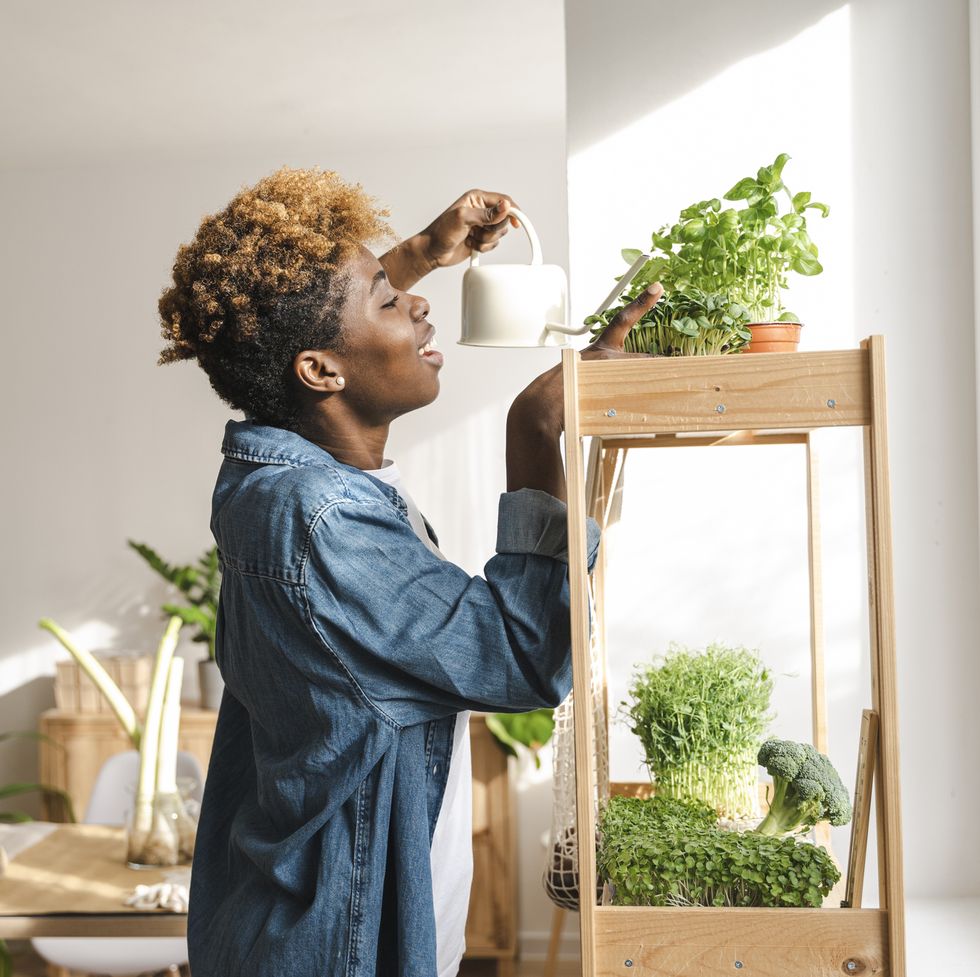- Gardening is associated with better health outcomes, including lower odds of cardiovascular disease and even diabetes, according to new research.
- Research suggests that gardening can also reduce the risk of depression and anxiety.
- Outdoor gardening is most beneficial, but indoor gardening can also be advantageous.
Maybe you’ve been gardening your entire life or just started growing your own plants in the past few years. Whether you’ve been tending to a few flowers or have a luscious garden full of produce for weeknight meals, it can be a very gratifying experience to grow your own food and plants. And all of that time gardening can benefit your body in other ways, too. A new study found that gardening may just be the secret to a healthy heart.
The study, published in the Journal of the Academy of Nutrition and Dietetics, looked at data collected from over 146,000 American adults over the age of 65. The participants were broken down into three groups — gardeners (older adults who garden), exercisers (ones who engage in other physical activities besides gardening) and non-exercisers (sedentary individuals). Gardeners reported spending more time staying physically active compared to exercisers, and they were able to meet the recommended 150 minutes of aerobic activity per week with just gardening alone.
Compared to sedentary individuals, gardeners reported significantly lower odds of cardiovascular disease, stroke, heart attack, high cholesterol, high blood pressure and even diabetes. They were also more likely to meet their fruit and veggie quota for the day (truly reaping the fruit’s from their labor!).
More From Good Housekeeping

But this isn’t the first time gardening has been associated with better health outcomes. Prior literature suggests that gardening can reduce depression and anxiety while increasing overall life satisfaction. Research also supports that gardening may promote healthy sleep too.
Why is gardening so good for you?
Our health and wellness experts say that the combination of physical activity and exposure to sunshine and nature is likely one of the main reasons why gardening does the body good. Getting your daily dose of vitamin D through gardening, aka the “sunshine vitamin,” can help keep your immune system in tip-top shape and boost overall mood. In fact, adequate vitamin D is necessary for maintaining a healthy heart, since it plays a key role in regulating blood pressure. Light gardening and yard work is considered a form of moderate physical activity, according to the Centers for Disease Control and Prevention, making it an interactive and enjoyable way to meet your daily activity needs while strengthening your DIY muscles.
Does indoor gardening count?
While there are more well-established benefits of outdoor gardening, if you don’t have access to an outdoor space to grow plants, an indoor garden may still be beneficial. The literature suggests that indoor gardening can be effective for improving sleep and cognition in dementia patients. One systematic review even found a beneficial association between indoor plants and diastolic blood pressure and academic achievement. Experts suggest that the appearance of indoor plants is valuable and note that their leaves can help purify the air by removing toxins, dust and microorganisms.
What are some other ways to promote a healthy heart?
Gardening is just one part of a healthy, active lifestyle that can support heart health. In addition to meeting the recommended physical activity requirements of 150 minutes of moderate-intensity exercise per week, diet also plays an important role. Our registered dietitians emphasize that a balanced, nutritious diet packed with a wide variety of fruits and vegetables is one of the best cardio-protective measures you can take (even better if you grow that produce in your home garden). Incorporating whole grains, lean sources of protein and healthy fats is also important, as is minimizing intake of ultra-processed foods that are high in sodium and added sugars.
The bottom line: The benefits of gardening not only promote a healthy heart, but also support mental and emotional health. While outdoor gardening has a variety of well-established benefits and can help you get your daily dose of vitamin D, even just having plants indoors in your home can prove to be beneficial for your health. Gardening may just be the secret to a fulfilling and healthy lifestyle.
Nutrition Lab Director
Stefani (she/her) is a registered dietitian, a NASM-certified personal trainer and the director of the Good Housekeeping Institute Nutrition Lab, where she handles all nutrition-related content, testing and evaluation. She holds a bachelor’s degree in nutritional sciences from Pennsylvania State University and a master’s degree in clinical nutrition from NYU. She is also Good Housekeeping’s on-staff fitness and exercise expert. Stefani is dedicated to providing readers with evidence-based content to encourage informed food choices and healthy living. She is an avid CrossFitter and a passionate home cook who loves spending time with her big one fit Greek family.

